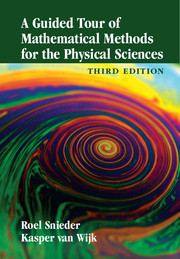Book contents
- Frontmatter
- Contents
- List of figures
- List of tables
- About the authors
- 1 Introduction
- 2 Dimensional analysis
- 3 Power series
- 4 Spherical and cylindrical coordinates
- 5 Gradient
- 6 Divergence of a vector field
- 7 Curl of a vector field
- 8 Theorem of Gauss
- 9 Theorem of Stokes
- 10 The Laplacian
- 11 Scale analysis
- 12 Linear algebra
- 13 Dirac delta function
- 14 Fourier analysis
- 15 Analytic functions
- 16 Complex integration
- 17 Green's functions: principles
- 18 Green's functions: examples
- 19 Normal modes
- 20 Potential field theory
- 21 Probability and statistics
- 22 Inverse problems
- 23 Perturbation theory
- 24 Asymptotic evaluation of integrals
- 25 Conservation laws
- 26 Cartesian tensors
- 27 Variational calculus
- 28 Epilogue, on power and knowledge
- References
- Index
11 - Scale analysis
Published online by Cambridge University Press: 05 March 2015
- Frontmatter
- Contents
- List of figures
- List of tables
- About the authors
- 1 Introduction
- 2 Dimensional analysis
- 3 Power series
- 4 Spherical and cylindrical coordinates
- 5 Gradient
- 6 Divergence of a vector field
- 7 Curl of a vector field
- 8 Theorem of Gauss
- 9 Theorem of Stokes
- 10 The Laplacian
- 11 Scale analysis
- 12 Linear algebra
- 13 Dirac delta function
- 14 Fourier analysis
- 15 Analytic functions
- 16 Complex integration
- 17 Green's functions: principles
- 18 Green's functions: examples
- 19 Normal modes
- 20 Potential field theory
- 21 Probability and statistics
- 22 Inverse problems
- 23 Perturbation theory
- 24 Asymptotic evaluation of integrals
- 25 Conservation laws
- 26 Cartesian tensors
- 27 Variational calculus
- 28 Epilogue, on power and knowledge
- References
- Index
Summary
Many equations we encounter in mathematical physics are too complicated to solve analytically. One of the reasons can be that an equation contains too many terms to handle. In practice, however, these terms may vary in size. Ignoring the smaller terms may simplify the problem to the extent that it can be solved in closed form. Moreover, by deleting terms that are relatively small, we can focus on the terms that contain the significant physics. In this sense, ignoring the smaller terms can actually give a better physical insight into the processes that really do matter.
Scale analysis is a technique in which one estimates the different terms in an equation by considering the scale over which the relevant parameters vary. This is an extremely powerful tool for simplifying problems. A comprehensive overview of this technique with many applications is given by Kline (1986) and in Chapter 6 of Lin and Segel (1974). Interesting examples of the application of scaling arguments to biology are given by Vogel (1998).
With the application of scale analysis one caveat must be made. One of the major surprises of classical physics of the twentieth century was the discovery of chaos in dynamical systems (Tabor, 1989). In a chaotic system small changes in the initial conditions lead to a change in the time evolution of the system that grows exponentially with time. Deleting (initially) small terms from the equation of motion of such a system can have a similar effect; this can lead to changes in the system that may grow exponentially with time. This means that for chaotic systems one must be careful in omitting small terms from the equations.
The principle of scale analysis is first applied to the problem of determining the sense of rotation of a vortex in an emptying bathtub. Many of the equations that are used in physics are differential equations. For this reason it is crucial in scale analysis to be able to estimate the order of magnitude of derivatives.
- Type
- Chapter
- Information
- A Guided Tour of Mathematical Methods for the Physical Sciences , pp. 145 - 165Publisher: Cambridge University PressPrint publication year: 2015



